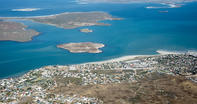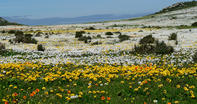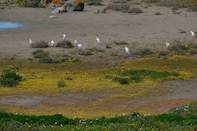Palaearctic Migrants
Most life in the Indian Ocean is concentrated on the coral reefs, where the symbiotic relationship between coral polyps and unicellular algae called zooxanthellae algae begins a food-chain that is the most fascinating and diverse of all marine habitats.

Estuaries and coastal lagoons along the west coast are havens for marine birds, especially the Palaearctic migrants that arrive to spend summer in the southern hemisphere.
Migrating waders such as curlews and whimbrels, some of the small plovers and sanderlings, turnstones and sandpipers, greenshanks, godwits and phalaropes congregate in vast flocks at Walvis Bay, Sandwich Harbour, Verlorenvlei and Langebaan Lagoon.
By international agreement, there are attempts to preserve the habitats of these tireless migrants and to this end large tracts of land in Greenland and Siberia have been declared reserves.
Postberg Peninsula

The deep marine inlet of Langebaan Lagoon, which is not really a lagoon, is situated at the heart of the West Coast National Park.
The area is a favourite playground for Capetonians, and is best known for the spring extravaganza on the Postberg Peninsula. But in early summer nature's great happenings occurs here, when tens of thousands of birds arrive from the Northern Hemisphere to feed on the mudflats.
Add to this the birds of the fynbos surrounds and you have an avian smorgasbord of surf and turf delights. Waders include curlew sandpiper curlew, common whimbrel, ruddy turnstone, wood sandpiper and greenshank, while land birds include black harrier, black-bellied bustard, cape penduline-tit and Karoo lark.
Birds and Wild Flowers

Add to this the birds of the fynbos surrounds and you have an avian smorgasbord of surf and turf delights. Waders include curlew sandpiper curlew, common whimbrel, ruddy turnstone, wood sandpiper and greenshank, while land birds include black harrier, black-bellied bustard, cape penduline-tit and Karoo lark.
By David Bristow Langebaan, few towns in South Africa exude as much of a beachy-breakaway feel as this spread-out dorp shimmering along the West Coast shores...
Langebaan, few towns in South Africa exude as much of a beachy-breakaway feel as this spread-out dorp shimmering along the West Coast shores...